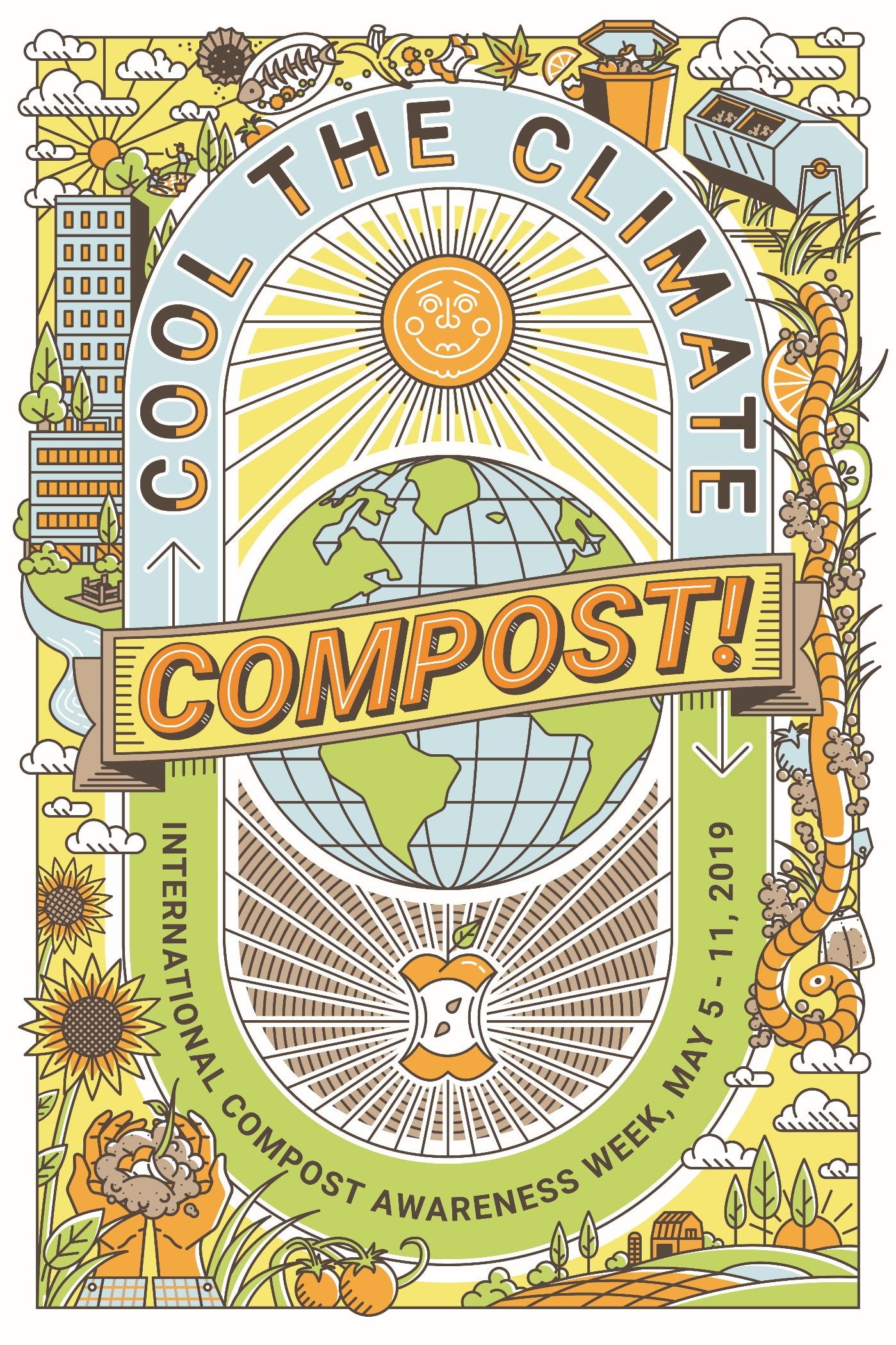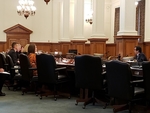 USCC’s Legislative and Environmental Affairs Committee (LEAC) has been tasked with the study and recommendation for response to a report completed for the Oregon Department of Environmental Quality (DEQ) on contamination and compostability. USCC’s Legislative and Environmental Affairs Committee (LEAC) has been tasked with the study and recommendation for response to a report completed for the Oregon Department of Environmental Quality (DEQ) on contamination and compostability.
USCC has always been a feedstock-neutral organization, meaning that our mission is to support compost manufacturers regardless of their feedstock inputs, focusing instead on trained and certified compost operation and the testing for quality protocols using the parameters outlined in the Seal of Testing Assurance Certified Compost program. Stay tuned for more information on this important issue.
When Amy and Todd Williams (USCC member, Jacobs Consulting) saw the extra Komptech Americas bags in the USCC COMPOST2019 office as the conference wound down, Amy immediately thought about the work that she and her healthcare colleagues do on mission trips to Niger, Africa, especially since she was heading that way in a few weeks.
A state of the art facility in Ontario, Canada will be the hub of research by Kellogg Garden Products to ensure that consistent, high-quality organic products are available to Kellogg’s customers throughout the U.S. The Janice L. Kellogg National Laboratory was designed by members of the company's quality assurance team from across the country, who designed, prepped and purchased all of the equipment.
This year, USCC offered a special recognition to a longtime volunteer who was so busy volunteering she was unable to accept the award in person! Nanci Koerting of Maryland has traveled to USCC conferences every year for the past decade to coordinate safety and site logistics at the Demonstration Day, held the day after every US Composting Council national conference.
Email is quick and easy, but it can get in the way of good communication. Imagine if your recipient reads your message in the line at the coffee shop, behind the wheel in the parking lot, or standing at a traffic light. They might forget to respond, and your effort is out the window.
Welcome to our new Nebraska Charter Chapter! The chapter is fiscally sponsored by the Nebraska Recycling Council, a longtime USCC member. Please say hello to Julie Diegel, their executive director, who leads their kickoff committee of Andy Harpenau of Soil Dynamics (USCC member), Ben Rice of Prairieland Gold, Jessica Placek of Crete Core Ingredients (USCC member) and NRC Board Liaison Gene Hanlon.
Seeking a manager to oversee the feedstock sourcing and contracting for our Waste to Value (WTV) facilities. Reporting to the WTV Asset Manager and liaising closely with the investment origination team, your work will be imperative to managing successful growth within the WTV business. To view the complete job board, click here.
Knowledge on how to properly take compost samples and handle the preparation of the sample for analysis is critical to getting reliable analysis, which is the basis for whether and how the compost will be used. Check out these videos, created through funding from the Composting Council Research and Education Foundation, for use as a reference for compost facility employees tasked with sample preparation.
The Legislative and Environmental Affairs Committee (LEAC) has set up two subcommittees, the Defining Advocacy Task Force and Model Zoning Task Force, for the coming year. They are not standing committees, so their term will be time-limited.
One of our most popular member benefits is the arrival of your official International Compost Awareness Week Poster—which will happen in the next week!
- If you haven’t seen your poster by March 25, please email Membership Director Linda Norris-Waldt.
- It's time to plan your International Compost Awareness Day Event! It's less than two months away!
- Ask your local or state elected officials to issue a proclamation!
- Hold an Open House!
- Give away some compost—and get names of potential customers on a sign-up sheet when they pick it up!
- Do a talk about composting at your local library or Master Gardeners meeting.
Look for more ideas and report your efforts here so the Composting Council Research and Education Foundation can list your event on their Media Calendar (you may get a call from a reporter!).
 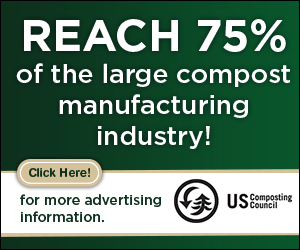
|

|

New Jersey is considering legislation to prioritize green stormwater infrastructure in design, construction and repair of public highways. New Jersey Composting Council President Jairo Gonzalez recently testified about amendments the NJCC is proposing to the bills to add compost to the definition of "green strormwater infrastructure methods."
The end product of compost is soil for gardens that grow flowers and vegetables. Composting literally makes the word a greener place to live. So why wouldn’t the city of Chicago want to encourage small composting businesses?
Several years ago, researchers in Marin County, Calif., found that compost applied to soil can sequester carbon from the atmosphere, reducing greenhouse gas (GHG) emissions while feeding soil and nourishing plants. Now, stakeholders in Colorado are looking at composting, among other methods, to sequester carbon to achieve the same farming and environmental benefits.
After using a new straw, you can compost it in your backyard, or even eat it. The straw, made with seaweed, looks and acts like plastic while someone is drinking, but if it ends up in the ocean, it quickly biodegrades.
RU Compost has recently started making compost collections available to students in order to encourage them to compost and appreciate their foods. The compost collections, which were launched earlier this year, can be found on the College Avenue campus in front of the Eva and Arie Halpern Hillel House.
Poncia’s Stemple Creek Ranch might be a model for future farmers with its sustainable agricultural practices to keep carbon in the soil and out of the atmosphere. Along with less greenhouse gas emissions, carbon-rich soil means healthier and more productive plants, according to rangeland ecologist Jeff Creque.
Compost training season is upon us—and members should remember that the Compost Operations Training Courses (COTCs) are available to you at a 10 percent discount! If your compost facility staff hasn’t taken this intense training or you are starting/diversifying into composting at your business, you should consider it. It covers fundamentals on biology, business and compost marketing, odor and safety management and regulatory issues. The last few classes have sold out, so register early. The Composting Council Research and Education Foundation, the host of the training, has added a second training in Monterrey, Calif. later this year. Use your member discount to register now!
 
The Maine Department of Environmental Protection is soliciting grant proposals to support the development, implementation or improvement of programs, initiatives or activities designed to increase the diversion of solid waste from disposal. All interested municipalities, regional associations, counties and Maine businesses are encouraged to apply.
19
Mar 2019
|
March 19-21, 2019; Lindsborg, KS
|
26
Mar 2019
|
March 26-27, 2019; Rochester, NY
|
1
Apr 2019
|
April 1-4, 2019; Portland, OR
|
7
Apr 2019
|
April 7-11, 2019; Oslo, Norway
|
9
Apr 2019
|
April 9, 2019; Hartford, CT
|
17
Apr 2019
|
April 17, 2019, 4-8 PM; University of Minnesota Landscape Arboretum, Minneapolis, MN
|
1
May 2019
|
May 1, 2019; Sacramento, CA
|
14
May 2019
|
May 14-16, 2019; Ann Arbor, MI
|
23
May 2019
|
May 23, 2019; Brooklyn Navy Yard, Brooklyn, NY
|
30
Jun 2019
|
June 30-July 3, 2019; Fort Collins, CO
|
5
Aug 2019
|
Aug. 5-9, 2019; Ithaca, NY
|
26
Oct 2019
|
October 26-27, 2019; Raleigh, NC
|
|

 USCC’s Legislative and Environmental Affairs Committee (LEAC) has been tasked with the study and recommendation for response to
USCC’s Legislative and Environmental Affairs Committee (LEAC) has been tasked with the study and recommendation for response to 
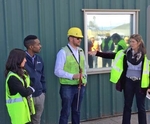
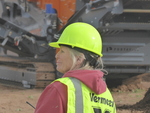


 The
The 

